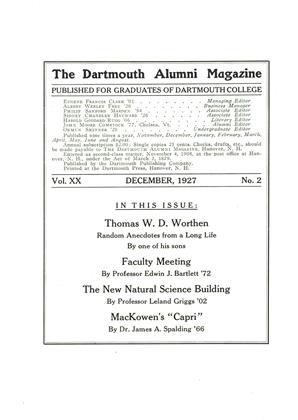General Chemistry by Professor Leon B. Richardson, 812 pages. Henry Holt and Company.
The scope Of Professor Richardson's book is the descriptive and theoretical chemistry by which the beginner enters this great field of knowledge. It contains references for reading, problems of exercises, tables, careful treatment of chemical equilibrium, dissociation, oxidation and reduction, colloids and osmotic action, radio activity. Although in the main inorganic, it concludes with chapters on plant life and nutrition, carbohydrates, animal nutrition not omitting vitamines, animal products, and synthetic organic compounds. It is abundantly illustrated with reproductions and with original drafts of apparatus. And it is made available for reference by a very comprehensive index.
I select three subjects for comment.
1. It is a readable book, written in a pleasant familiar style but without any sacrifice of scientific precision or of careful diction. It might be read by any serious-minded person wishing to inform himself upon the chemistry of today; and it should be read, or better studied, by those in process of education for callings in which (they have the notion) chemistry will be of no use to them like banking, preaching, life insurance, journalism.
2. The author in his preface tells us that he has two points in mind,—to establish in the student's mind the scientific method, the point of view, consideration of the science as an organic whole; and to give a clear conception of the place of the science in human progress. In the first of these points he has put his finger on one of the most difficult and trying obstacles to the beginner; and the results of using the book with earnestness will constitute the best test of his success. The second point he has made clear by constant reference to uses and applications.
3. And" he has seen a great light and has had the courage as well as the industry to follow where it leads. Most of the introductory texts in chemistry, for various reasons—the demands of publishers and purchasers, time limits, the idea of an easy start—tend to great conciseness, with the plan that the talking or lecturing teacher will supply the brain food in proper dilution. Professor Richardson holds exactly the opposite view. He is "convinced" that the text is the vital element. Lectures have their place ... but as the point around which the course really centers they are pitiably ineffective. The student . . . must mull over it at his leisure." Hence the 812 pages. And hence very full and free discussions and detailed expositions of such carefully reasoned subjects as the determination of molecular and atomic weights, formulas and their meaning and many others, with sharp discrimination between facts, inferences -from facts, and theories. Argument and explanation are in the text, and the student is not obliged "to catch them on the wing," or from an imperfect notebook wrest a still more imperfect understanding.
The book is a credit to author and publisher.
The Tower nears completion
 View Full Issue
View Full Issue
More From This Issue
-
 Lettter from the Editor
Lettter from the EditorEditorial Comment
December 1927 -
 Article
ArticleTHOMAS W. D. WORTHEN
December 1927 By One of His Sons -
 Article
ArticleFACULTY MEETING
December 1927 By Professor Edwin J. Bartlett '72 -
 Article
ArticleALUMNI ASSOCIATIONS
December 1927 -
 Class Notes
Class Notes1918
December 1927 By Frederick W. Cassebeer -
 Class Notes
Class NotesClass of 1911
December 1927 By Nathaniel G. Burleigh
Books
-
 Books
BooksALL THE BEST IN JAPAN AND THE ORIENT INCLUDING HONG KONG, MACAO, TAIWAN AND THE PHILIPPINES.
JUNE 1964 By DONALD BARTLETT '24 -
 Books
BooksTHE BURNING FOUNTAIN: A STUDY IN THE LANGUAGE OF SYMBOLISM.
February 1955 By F. C. FLINT -
 Books
BooksTHE ECONOMY AND ITS MONEY
November 1948 By G. W. Woodworth -
 Books
BooksRake's Progress
March 1977 By JAMES L. FARLEY'42 -
 Books
BooksWALT WHITMAN IN ENGLAND
October 1934 By Kenneth A. Robinson -
 Books
BooksHEAD AND NECK INJURIES IN FOOTBALL: MECHANISMS. TREATMENT, AND PREVENTION.
April 1974 By THOMAS E. CLARKE '66


